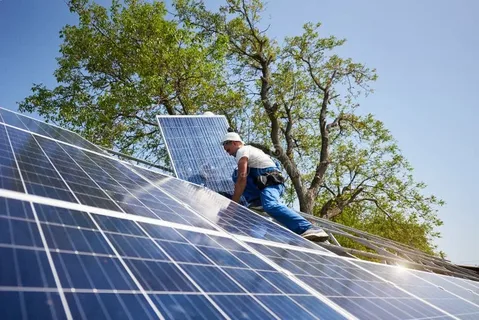Stand alone off grid solar power is an innovative approach to harnessing solar energy without relying on traditional power grids. This system operates independently, making it an attractive option for individuals and businesses aiming to adopt more sustainable energy practices. As global energy demands grow and environmental concerns intensify, these systems are gaining attention for their efficiency and ability to reduce carbon footprints. By converting sunlight directly into usable electricity and storing excess energy for future use, stand-alone solar power provides a reliable and eco-friendly energy solution. Its potential to offer energy independence and significant cost savings further underscores its growing importance in today’s energy landscape.
How Stand Alone Solar System Works
Stand alone solar system functions independently by capturing and converting sunlight into electricity. Central to these systems are solar panels, which absorb sunlight and transform it into direct current (DC) electricity.
This DC electricity is converted into alternating current (AC) by an inverter, making it suitable for everyday use in homes and businesses. Integral to their operation are battery storage units, which store excess energy generated during sunny periods.
This stored energy can be utilised when sunlight is insufficient, such as at night or during cloudy weather. By maintaining a consistent energy supply, these systems ensure reliable power availability. The design and efficiency of these systems enable them to provide continuous and dependable electricity without needing a connection to the primary power grid.
Environmental Benefits of Stand Alone Solar Power
Stand alone solar power contributes significantly to reducing environmental impact. These systems utilise renewable energy from the sun, producing no greenhouse gases during operation. This lack of emissions helps to mitigate climate change and reduces air pollution, which is particularly beneficial in urban areas where air quality can be a significant concern.
Additionally, stand-alone solar systems reduce dependence on finite fossil fuels, which often cause environmental degradation through extraction processes such as mining and drilling. Solar power also reduces water usage compared to conventional power plants, which require significant water for cooling.
Moreover, using solar power helps decrease noise pollution, as solar panels and related equipment are virtually silent. As technology improves, the efficiency of these systems continues to increase, further amplifying their positive environmental impact. The widespread adoption of stand-alone solar power can promote sustainable development and conserve natural resources for future generations.
Economic Advantages
Stand-alone solar power systems offer significant economic benefits. One of the primary advantages is the potential for substantial cost savings on electricity bills. By generating electricity independently from the sun, users can reduce or even eliminate their reliance on expensive utility-provided power. This is particularly advantageous in areas where electricity rates are high or where access to the power grid is limited.
Various financial incentives and rebates from government programmes can offset the initial investment in stand-alone solar systems. Additionally, the cost of solar technology has decreased over the years, making these systems more affordable for a broader range of consumers.
Maintenance costs for stand-alone solar systems are generally low, as they have few moving parts and are designed to operate efficiently over long periods. Solar panels typically have extended warranties, ensuring they continue generating electricity effectively for decades.
Businesses adopting stand-alone solar systems can also benefit from tax breaks and other incentives to promote renewable energy use. Predicting and controlling energy costs can improve financial planning and stability. The savings can be substantial for industries with high energy consumption, contributing to overall economic growth and competitiveness.
Energy Independence with Stand Alone Solar System
Benefits of Stand-Alone Solar Systems
Stand alone solar system present a significant benefit by enabling energy autonomy. Unlike conventional power sources dependent on a centralised grid, these systems empower individuals to produce electricity directly from sunlight.
This feature is especially advantageous in isolated or countryside locations where access to the power grid is restricted or unavailable. Additionally, it ensures users are not vulnerable to power cuts due to grid malfunctions, which can be crucial in areas susceptible to severe weather or natural calamities.
Economic and Environmental Advantages
Achieving energy autonomy also offers enhanced control over energy consumption and expenditures. Users are shielded from unpredictable utility prices or possible rate increases by generating their power. This consistency is vital for households and businesses, providing budgeting and financial planning certainty.
Self-Reliance and Durability
Beyond economic benefits, energy autonomy from stand-alone solar systems encourages self-reliance and durability. This is particularly significant for companies needing a stable and dependable power source for their activities, allowing them to sustain productivity and avoid interruptions linked to power outages.
Moreover, the capacity to independently generate and store power allows individuals to embrace a more eco-friendly lifestyle, lessening their environmental footprint while guaranteeing a reliable energy supply.
Applications in Residential Settings
Stand-alone solar power systems are becoming increasingly popular in residential settings due to their numerous benefits. These systems provide homeowners with a reliable source of electricity, independent of the traditional power grid. This is particularly advantageous in remote or rural areas with limited or unreliable grid access.
Additionally, residential stand-alone solar systems can offer significant cost savings over time by reducing or eliminating electricity bills. The surplus energy generated during sunny periods can be stored in batteries during nighttime or cloudy days, ensuring a consistent power supply.
Another key advantage is the ease of installation and low maintenance requirements. Modern solar panels are designed to be durable and efficient, often with extended warranties. This makes them a practical investment for homeowners adopting sustainable energy practices. Moreover, integrating stand-alone solar systems with existing home energy management systems is increasingly straightforward, allowing for optimised energy use and further cost reductions.
Furthermore, the adoption of solar power in homes can enhance property values. As energy-efficient and eco-friendly homes become more desirable, having a stand-alone solar system can make a property more attractive to potential buyers. This not only offers immediate benefits but also long-term financial advantages for homeowners.
Commercial and Industrial Use of Off Grid Stand Alone Solar Power System
Advantages of Off-Grid Solar Systems for Businesses
Independent off grid stand alone solar power system setups are becoming popular in business because they deliver consistent and economical energy. These setups are particularly useful for companies in secluded locations where connecting to the main power supply is challenging or impossible.
By tapping into solar resources, organisations can lessen their reliance on non-renewable energy sources and decrease their running expenses. The flexible nature of these solar systems makes them applicable for various uses, from small enterprises to extensive industrial projects.
Financial and Operational Benefits
For business ventures, switching to solar energy can reduce costs, especially in sectors with substantial energy needs like manufacturing, farming, and extraction. Lowering operational expenses can enhance profit margins and boost market competitiveness.
Governmental Programmes
In addition, businesses can take advantage of various governmental programmes supporting green energy, which can help counterbalance the upfront costs of installation. Industrial sites gain significantly from the dependability and steadiness provided by independent solar systems, ensuring continuous power, which is vital for ongoing production and avoiding expensive interruptions.
Moreover, adopting solar energy improves a company’s ethical profile, attracting eco-friendly consumers and stakeholders. With continuous progress in solar technology, these systems are becoming more efficient and effective, proving to be a smart long-term choice for business and industrial users.
Technological Advancements in Stand-Alone Solar System
Stand-alone solar systems have experienced significant technological advancements in recent years, contributing to their increased efficiency and effectiveness. One notable development is improved solar panel technology, including high-efficiency photovoltaic cells that convert more sunlight into electricity.
This has led to the creation of panels that can generate more power from the same amount of the sun, making solar energy more viable even in less intense sunlight.
Another significant advancement is in energy storage solutions. Modern battery technologies, such as lithium-ion and emerging solid-state batteries, offer higher storage capacities, longer lifespans, and faster charging times. These advancements allow for better storage and utilisation of excess energy generated during peak sunlight, ensuring a more consistent power supply.
Additionally, smart inverters and energy management systems have enhanced stand-alone-solar stand-alone solace. These devices can optimise the conversion of DC to AC electricity, manage power distribution, and even integrate with other renewable energy sources.
Integrating the Internet of Things (IoT) technology has also brought intelligent monitoring and management systems, enabling users to track their energy production and consumption in real-time. This enhances efficiency and provides valuable data for future improvements and maintenance.
Challenges and Considerations
While offering numerous benefits, stand-alone solar power systems also have specific challenges and considerations. One primary concern is the initial installation cost, which can be relatively high despite decreasing prices of solar technology.
This includes the cost of solar panels, inverters, batteries, and other necessary components. Although financial incentives and rebates can offset some of these costs, the upfront investment can still be a barrier for some users.
Another consideration is the variability of solar energy production. Since these systems rely on sunlight, their efficiency can be affected by weather conditions and geographical location. The energy production may not be consistent in regions with frequent cloudy weather or shorter daylight hours during certain seasons. This necessitates a well-designed energy storage solution to ensure a steady power supply.
Moreover, maintaining batteries and other system components is essential to ensure long-term efficiency and reliability. Batteries, in particular, have a finite lifespan and will eventually need to be replaced. This ongoing maintenance can incur additional costs over time.
Additionally, installing stand-alone solar systems may require sufficient space, which can be a limitation for some properties. Ensuring proper placement and orientation of solar panels to maximise sunlight exposure is crucial for optimal performance.
Conclusion
Stand alone off grid solar power systems represent a forward-thinking solution for sustainable and reliable energy production. Their ability to operate independently from the traditional power grid makes them ideal for residential and commercial applications. These systems offer significant environmental benefits by utilising renewable energy and reducing greenhouse gas emissions. Economically, they provide cost savings through reduced utility bills and various financial incentives. Despite initial installation costs and the need for maintenance, the long-term benefits and technological advancements make stand-alone solar power a viable and attractive option for many. As solar technology evolves, the adoption of these systems will likely increase, contributing to a more sustainable energy future.
FAQs
What are the environmental benefits of using stand alone off grid solar power systems?
Stand alone off grid solar power systems significantly help the environment by reducing harmful emissions and decreasing dependence on traditional energy sources like coal and oil. By using the sun’s energy, they help address global warming concerns.
How do stand-alone solar power systems provide economic advantages?
Economically, these systems can lower electricity expenses by allowing homes and businesses to produce power. Additionally, government programmes often offer financial incentives and discounts to help with installation costs, making these systems more financially viable.
What technological advancements have improved stand-alone solar systems?
Recent technological progress has made these systems more efficient. Better solar panels and sophisticated batteries improve energy output and storage. Innovative technologies and internet-based systems further optimise energy management and allow users to track their energy usage in real time.
How do these systems benefit residential areas and incredibly remote locations?
Stand-alone solar systems provide homes, especially those far from urban centres, with independence from the national grid. They also add value to properties by making them more efficient and appealing to potential buyers.
What role do stand-alone solar systems play in commercial settings?
In business environments, these systems offer a stable and economical energy source, helping reduce running costs and improving competitive edge. Reliable power is essential for industries that consume large amounts of energy.
| Related Business Listings |
| Contact Directory |
| Local Business Profiles |




